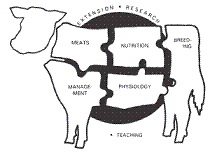Animal Science, Department of

Nebraska Beef Cattle Reports
Date of this Version
2018
Citation
2018 Nebraska Beef Cattle Report. University of Nebraska Extension MP105. Lincoln, NE.
Abstract
Small business meat processors can use organic acid antimicrobial interventions to control Shiga toxin-producing E. coli (STEC) when producing ground beef; however, many small producers are concerned about the impact on ground beef quality. The effects of two commonly used organic acids, lactic acid and peroxyacetic acid, were evaluated at short (15 seconds) or extended (3 minutes) raw material dip times on ground beef quality parameters. Beef trim dipped in lactic acid for 3 minutes had a reduction in total aerobic bacteria plate count, but also increased ground beef discoloration and lipid oxidation during retail display. Use of a shorter dip time showed minimal differences in ground beef quality compared to untreated controls. In addition, dipping lean trim in peroxyacetic acid for 3 minutes slowed ground beef discoloration during display. Therefore, processors should consider either type of organic acid, and the length of lean trim exposure to organic acid during dipping, to optimize shelf life quality attributes.
Included in
Large or Food Animal and Equine Medicine Commons, Meat Science Commons, Veterinary Preventive Medicine, Epidemiology, and Public Health Commons


Comments
© 2017 The Board Regents of the University of Nebraska.